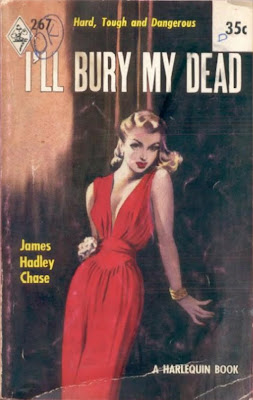
Why keep flogging? Well, for one thing, I'm not so sure this horse is dead; the scandal surrounding Harlequin's Vintage Collection continues to spread. Scandal... not too strong a word, is it? After all, here we have a publisher that took six novels, tinkered with grammar and spelling, substituted phrases, removed any and all scenes it thought offensive, and then sold the results as being identical to the originals.
So, yes... scandal. And like any scandal, information trickles forth like the drool collected by Miles Copperthwaite. Today, an interview with associate editor Adrienne Macintosh: "The Inside Scoop on the Harlequin Vintage Collection".

There are no tricky questions here – the interviewer is a fellow employee – but taken with executive editor Marsha Zinberg's Harlequin blog post, it does provide a revealing glimpse into Harlequin's culture. We learn, for example, that only eight books were considered for the series, each chosen on the basis of cover alone. Something called Nine to Five by some guy named Harvey Smith was dropped because it was too long and boring, while Anneke de Lange's Anna... I'll let Ms Macintosh explain:
From the cover you might think the story was about... er, well, rolling in the hay. But that couldn't be further from the truth. Let's just say that the plot involves jealousy, hatred, physical abuse, rape, suicide, murder, racism, adultery, a couple of unwanted pregnancies and a mother so unlikeable that you are actually glad when she’s stabbed by her son. In any case, that one was nixed.
Ms Macintosh and Ms Zinberg each express ignorance of their company's origins, surprise at the grittiness of pulp fiction, make a big deal over having had texts retyped, and see considerable changes in our language:
Ms Zinberg: "Also, grammar and spelling standards have changed quite a bit in sixty years."Ms Macintosh: "Grammar and spelling has [sic] also changed quite a bit in the past sixty years..."
We're informed, for example, that "loogan" is no longer in use.
Loogan?
Here's Philip Marlowe with a definition:
"What's a loogan?""A guy with a gun.""Are you a loogan?""Sure," I laughed. "But strictly speaking a loogan is a guy on the wrong side of the fence."

These words come from The Big Sleep. I found them in Stories and Early Novels, the first in the Library of America's two-volume Raymond Chandler collection. Now, as a nonprofit publisher "dedicated to preserving the works of America's greatest writers in handsome, enduring volumes, featuring authoritative editions", Library of America is pretty well everything Harlequin is not. Recognition of this fact raises the question: Are we being too hard on this multi-national?
I don't think so. After all, each title in the Harlequin collection bears a message from its president and CEO stating: "it is such fun to be able to present these works with their original text and cover art".
It appears the Vintage Collection, which both editors thought would be such a simple project, became a burden because they encountered challenges only too familiar to those who work at other houses; little things like trying to track down copyright (at which they failed). In short, these editors were out of their depths; and still know not of what they speak. How else to explain Ms Macintosh's absurd assumption: "These are fifty-, sixty-year-old books. The authors have passed away".
RIP Mavis Gallant. RIP Farley Mowat.
Related posts:















